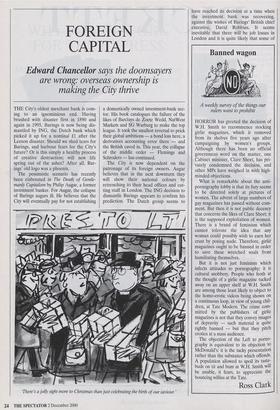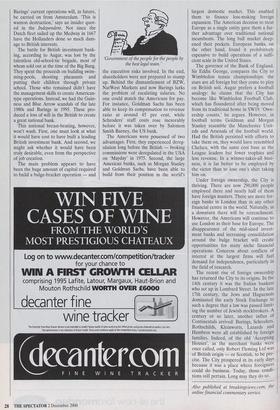FOREIGN CAPITAL
Edward Chancellor says the doomsayers
are wrong: overseas ownership is making the City thrive
THE City's oldest merchant bank is com- ing to an ignominious end. Having brushed with disaster first in 1890 and again in 1995, Barings is now being dis- mantled by ING, the Dutch bank which picked it up for a nominal fl after the Leeson disaster. Should we shed tears for Barings, and harbour fears for the City's future? Or is this simply a healthy process of creative destruction; will new life spring out of the ashes? After all, Bar- ings' old logo was a phoenix.
The pessimistic scenario has recently been elaborated in The Death of Gentle- manly Capitalism by Philip Augar, a former investment banker. For Augar, the collapse of Barings augurs ill. He believes that the City will eventually pay for not establishing a domestically owned investment-bank sec- tor. His book catalogues the failure of the likes of Barclays de Zoete Wedd, NatWest Markets and SG Warburg to make the top league. It took the smallest reversal to prick their global ambitions — a bond loss here, a derivatives accounting error there — and the British caved in. This year, the collapse of the middle order — Flemings and Schroders — has continued.
The City is now dependent on the patronage of its foreign owners. Augar believes that in the next downturn they will show their national colours by retrenching to their head offices and cut- ting staff in London. The ING decision to dismantle Barings appears to confirm his prediction. The Dutch group seems to have reached its decision at a time when the investment bank was recovering, against the wishes of Barings' British chief executive, David Robbins. It seems inevitable that there will be job losses in London and it is quite likely that some of Barings' current operations will, in future, be carried on from Amsterdam. 'This is wanton destruction,' says an insider quot- ed in the Independent. Not since the Dutch fleet sailed up the Medway in 1667 have the Hollanders done so much dam- age to British interests.
The battle for British investment bank- ing, according to Augar, was lost by the talentless old-school-tie brigade, most of whom sold out at the time of the Big Bang. They spent the proceeds on building swim- ming-pools, shooting pheasants and putting their children through private school. Those who remained didn't have the management skills to create American- type operations. Instead, we had the Guin- ness and Blue Arrow scandals of the late 1980s and Barings in 1995. These pro- duced a loss of will in the British to create a great national bank.
This national breast-beating, however, won't wash. First, one must look at what it would have cost to have built a leading British investment bank. And second, we might ask whether it would have been truly desirable, even from the perspective of job creation.
The main problem appears to have been the huge amount of capital required to build a bulge-bracket operation — and the execution risks involved. In the end, shareholders were not prepared to stump up. Behind the dismantlement of BZW, NatWest Markets and now Barings lurks the problem of escalating salaries. No one could match the Americans for pay. For instance, Goldman Sachs has been able to keep its compensation to revenue ratio at around 45 per cent, while Schroders' staff costs rose inexorably before it was taken over by Salomon Smith Barney, the US bank.
The Americans were possessed of two advantages. First, they experienced dereg- ulation long before the British — broking commissions were deregulated in the USA on 'Mayday' in 1975. Second, the large American banks, such as Morgan Stanley and Goldman Sachs, have been able to build from their position in the world's largest domestic market. This enabled them to finance loss-making foreign expansion. The American decision to treat Europe as a single entity gave them a fur- ther advantage over traditional national incumbents. The long bull market deep- ened their pockets. European banks, on the other hand, found it prohibitively expensive to build operations of a suffi- cient scale in the United States.
The governor of the Bank of England, Sir Eddie George, compares the City to Wimbledon tennis championships: the stars are all foreign but they come to play on British soil. Augar prefers a football analogy: he claims that the City has become like Wimbledon Football Club, which has floundered after being moved from its traditional home in SW19. 'Own- ership counts,' he argues. However, in football terms Goldman and Morgan Stanley resemble the Manchester Unit- eds and Arsenals of the football world. Had the British persisted with efforts to take them on, they would have resembled Chelsea, with the same cost base as the League leaders but fewer trophies and less revenue. In a winner-takes-all busi- ness, it is far better to be employed by the victor than to lose one's shirt taking him on.
Under foreign ownership, the City is thriving. There are now 290,000 people employed there and nearly half of them have foreign masters. There are more for- eign banks in London than in any other financial centre in the world. Naturally, in a downturn there will be retrenchment. However, the Americans will continue to use London as their base for Europe. The disappearance of the mid-sized invest- ment banks and increasing consolidation around the bulge bracket will create opportunities for many niche financial operations. Concerns about conflicts of interest at the largest firms will fuel demand for independence, particularly in the field of research.
The recent rise of foreign ownership has returned the City to its origins. In the 14th century it was the Italian bankers who set up in Lombard Street. In the late 17th century, the Jews and Huguenots dominated the early Stock Exchange to such a degree that a law was passed limit- ing the number of Jewish stockbrokers. A century or so later, another influx of Continentals arrived: Barings, Schroders, Rothschilds, Kleinworts, Lazards and Hambros were all established by foreign families. Indeed, of the old 'Accepting Houses', as the merchant banks were once called, only Robert Fleming Ltd was of British origin — or Scottish, to be pre- cise. The City prospered in its early days because it was a place where foreigners could do business. Today, those condi- tions still pertain. Long may they do so.
Also published at breakingviews.com, the online financial commentary service.



















































































 Previous page
Previous page